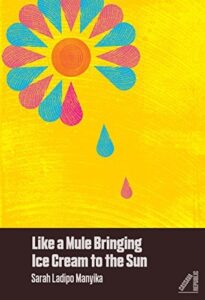By Leonora Ifeanyichukwu
Like a Mule Bringing Ice Cream to the Sun by Sarah Ladipo Manyika
What does it mean to live a life without hesitation? To live a life worth reminiscing about within the colorless walls of a hospital? These are the kinds of questions that linger long after closing the final page of this gem of a novella.
Morayo Da Silva, a cosmopolitan Nigerian woman on the cusp of 75, lives alone in vibrant San Francisco. Full of life, with a sharp mind and a deep appreciation for literature and sensuality, Morayo delights in solo road trips in her vintage Porsche, chats with strangers, and loses herself in memories of both her favorite books and her own life’s chapters. But then she falls, and her independence begins to crumble.
Without immediate family nearby, Morayo must lean on friendships, chance encounters, and the strength of her imagination. Through her eyes, we meet a host of vivid characters: Dawud, a charming Palestinian shopkeeper; Sage, a feisty, homeless Grateful Dead devotee; Sunshine, a devoted wife quietly burning out; and Antonio, the poet she once desired more than her diplomat husband.
This isn’t a plot-driven story. If you’re expecting dramatic twists, you may be disappointed. But what Sarah Ladipo Manyika offers instead is richer: a character so vibrant that she alone becomes the story. Dr. Morayo Da Silva, a retired literature professor, suffers from what one might call “main character syndrome,” and yet you’ll love her for it. She romanticizes every moment of her life, often making you forget she’s nearly 75. She’s bold, poetic, unapologetically present, and entirely spontaneous. Morayo is full of quirks that make her unforgettable, including her “earthquake bag,” packed with essentials and kept beside her bed, just in case disaster strikes. It’s a telling detail, revealing her independent spirit and readiness to face life’s unpredictabilities.
Indeed, Like a Mule Bringing Ice Cream to the Sun is as much about arriving as it is about remembering.
Manyika uses flashbacks with finesse, weaving past and present seamlessly. The real power of the book lies in its tender portrayal of friendship, memory, and the quiet ache of aging. I picked up this book for its unusual title and stunning yellow cover, but I stayed for the prose: gentle, lyrical, and deeply human, and for the unforgettable character I met.
Her vivid descriptions of the setting lend a cinematic quality to the novella, transporting readers from the steep hills of San Francisco to the bustling heart of Lagos and the quieter landscapes of Jos. Manyika paints each place with sensitivity and detail, grounding Morayo’s journey in a broader social and historical context. Through subtle references to events and eras, she quietly anchors the story in time without ever overwhelming the narrative.
What sets this novella apart is its unflinching embrace of aging as a legitimate and even liberating state of being. Rather than approaching old age as decline, Manyika reframes it as a threshold of presence. In a culture obsessed with youth and reinvention, Morayo’s story feels radical. It asserts that life does not simply taper off with age; it expands inwardly, richly, and profoundly.
This novella is about taking up space at any age, about yearning, about choosing joy. Through Morayo, we’re reminded that aging doesn’t mean disappearing; sometimes it means fully arriving. The book gave me a glimpse into what the future could look like, and it’s looking good. Maybe I’m biased, but I believe this is a gem all women should read.
Sarah Ladipo Manyika subtly critiques societal perceptions of aging, especially for women of color. It engages, too, with themes of trauma, displacement, and cultural dislocation, never didactically, but with emotional intelligence. There are fleeting but impactful references to sexual violence, divorce, and loneliness. These moments are never forced; they are folded into the story the way life folds in heartbreak: softly, and often without warning.
The settings are equally evocative. Manyika moves seamlessly between San Francisco’s steep, quirky streets and the more distant memories of Lagos and Jos. Her depiction of place is cinematic, offering a sensory tapestry that further enriches the reader’s immersion.
For readers drawn to introspective, character-driven fiction that celebrates the quiet dignity of everyday life, Like a Mule Bringing Ice Cream to the Sun is an exquisite find. Fans of Yewande Omotoso’s The Woman Next Door or Fredrik Backman’s A Man Called Ove will recognize the same tender reverence for characters often overlooked by society.
Morayo Da Silva is not just a character; she’s a reminder that living well is an art, that aging can be graceful, and that some of the most beautiful stories unfold not in grand climaxes, but in the subtle pauses in between. This novella does not ask to be rushed. It asks only to be seen. Like its heroine, it is unapologetically present and utterly unforgettable.
About the Author:
Sarah Ladipo Manyika (b. March 7, 1968) is a British Nigerian novelist, essayist, and critic. Born in Nigeria, she has lived in Kenya, France, Zimbabwe, the UK, and the United States. Her debut novel, In Dependence (2008), became a bestseller and required reading in Nigerian schools. Her second novel, Like a Mule Bringing Ice Cream to the Sun (2016), was shortlisted for the Goldsmiths Prize and the California Book Award, the first time an African novel received such recognition.
Publishing Details:
Title: Like a Mule Bringing Ice Cream to the Sun
Author: Sarah Ladipo Manyika
Publisher: Cassava Republic Press
Publication Year: 2016
Pages: Approximately 118 pages
Language: English
Genre: Literary Fiction / Contemporary Fiction


